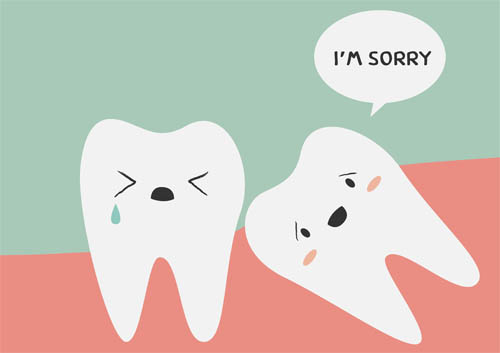November 6th, 2019

If you want to fix staining, large gaps, fillings, chipped teeth, or the overall shape of your teeth, this may be the perfect option for you. Many of our patients opted for veneers and have never been more confident in their smile!
Dental veneers are made from long-lasting porcelain materials which cover the front and biting ends of each tooth. At your appointment, you can choose the shade of veneers to brighten up your smile. They are usually placed on the anterior, or front teeth, where the chewing forces are not as hard as in the back. Placing the veneers is easy, and the best part is: It requires only two appointments!
During the first appointment, we’ll take an impressions of your teeth. Then we send them to the lab to make your veneers. Veneers are fairly conservative in preparation because they require a small amount of space to be created on the front, bottom, and sides of each tooth for a natural appearance. You will leave the office with temporary veneers in place for a week or two while the permanent veneers are being made.
Your veneers will be placed during the second appointment, and you won’t believe the difference in your smile! If you’re interested in learning more, give Dr. Emily Schaefer a call at our Buffalo office today!
October 30th, 2019

When your wisdom teeth start to emerge it can definitely be painful, but it can be even worse if your wisdom teeth become impacted. Impacted wisdom teeth are trying to erupt but are unable to do so because there is not sufficient room for them to emerge. This usually means that your wisdom teeth are painfully lodged in your jawbone.
While you may not see any real signs of the emerging wisdom teeth when they are impacted, what you can’t see can still definitely hurt you. Some of the indicators of impacted wisdom teeth are listed below.
- Jaw Pain: Pain in the back of your jaw is a common indicator of impacted wisdom teeth. The pain often concentrates in the area around your gums.
- Changes in the Mouth: You may notice some changes in your mouth when you have impacted wisdom teeth. Reddish gums, swelling in the jaw, bleeding gums, and bad breath can all be indicators that you are dealing with impacted wisdom teeth.
- Headaches: If you suddenly start having headaches, especially at the same time as some of the other issues mentioned above, they may indicate impacted wisdom teeth.
- Chewing Issues: Problems with chewing normally can indicate impacted wisdom teeth. If you are having trouble making the chewing motions because your mouth won’t quite open and close as easily as it used to, impacted wisdom teeth may be the culprit.
The Solution
If you are suffering from impacted wisdom teeth, the best solution is usually going to be removal. This is not a problem that will resolve naturally, and in fact, your pain and other symptoms may worsen as your wisdom teeth become increasingly impacted. At Emily J. Schaefer, DDS, PC, Dr. Emily Schaefer can review the details of wisdom teeth removal surgery with you and help you determine if this is the best solution for your situation.
October 23rd, 2019

These days, it’s become more common to see adults at our office getting their teeth straightened with Invisalign clear aligners . . . that is, if you can see them! Whether they are seeking to overcome the stigma that “braces are just for kids,” or simply want straighter teeth without a mouth full of metal, Invisalign is an effective and easy solution.
According to the American Association of Orthodontists, from 1994 to 2010 the number of adults 18 and older who request braces increased by 58 percent: from 680,000 to 1.1 million a year. Many adults enjoy how discreet the aligners are and that the user doesn’t need to avoid any foods or make dietary changes the way you would with traditional braces. Also, each treatment is unique to the patient.
With an Invisalign treatment, you can expect to enjoy the following benefits over traditional braces:
- The total treatment time is more precise with Invisalign because your treatment is modeled by a computer. Traditional braces depend more on an estimate and aren’t as exact.
- You’ll make fewer trips to our Buffalo office, since you’re able to change your trays on your own every few weeks or whatever is prescribed.
- Without brackets to place over your teeth, there’s less risk to the health of your tooth enamel.
- Invisalign aligners are clear and practically invisible, so most people won’t even know you’re wearing them!
If you’re interested in Invisalign as a treatment option, please let Dr. Emily Schaefer know. We’d be happy to help you on your journey to a straighter, healthier smile!
October 16th, 2019

Nobody likes a dry mouth. It is an uncomfortable and sometimes oddly unexplainable sensation that most people like to avoid. It is not a condition that automatically sends you into a panic about your health, however, a dry mouth can be a bother and something you certainly want to change if possible. So, if you find yourself in the unpleasant position of having a dry mouth, here is what you can do.
Chew Sugar-free Gum: Chewing sugar-free gum will stimulate saliva in your mouth. The chewing motion of your jaw and teeth should take care of at least some of your dry mouth problem.
Suck on Sugar-free Candy: Similarly to chewing sugar free gum, if you suck on sugar free candy it should create more saliva in your mouth and moisturize it in the process.
Cut out the Caffeine:Caffeine can contribute to a dry mouth so by limiting, or eliminating your intake all together, you may find that your dry mouth is no more.
Stop Using Tobacco Products: Tobacco is another cause of dry mouth. Whether it is smokeless tobacco products or cigarettes, if you stop using them your dry mouth will likely improve. And not to forget, these products are exceedingly bad for your oral health to begin with, so you will be doing your mouth a favor even more so.
Drink Lots of Water: It may seem obvious, but drinking lots of water will likely improve your dry mouth. This is because dry mouth is usually a sign of dehydration, so plenty of fluids will surely help.
Dry mouth can be unpleasant, but it is often easily solved by either drinking more water, or trying one of the previously mentioned techniques. If the problem still persists you can always visit our Buffalo office to see Dr. Emily Schaefer. More often than not, doing one of the above will leave your mouth more moisturized than it was previously, and hopefully it will be long-lasting as well.





